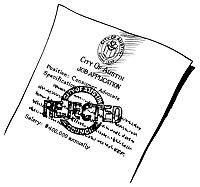Consumers Beware
Citizen Advocate Gets Bounced
By Audrey Duff, Fri., Feb. 21, 1997
 illustration by Doug Potter |
The aggressive former assistant attorney general has a long history of fighting for residential ratepayers. Before he even finished college, he successfully battled as a neighborhood activist to secure the so-called "life-line rate" which provides discounts for Austin residents on the first 500 kilowatt hours they use. In 1984 he was hired away as an associate from Austin's Bickerstaff, Heath & Smiley to join the Attorney General (AG)s consumer division under Jim Mattox, the AG most celebrated as a consumer champion. For 10 years McCollough represented the state, taxpayers, and consumers with regards to utility issues. He also represented the utilities themselves -- from electric and telephone to gas and water. Most recently, he's being paid $63,000 by us to make sure that the Federation of Austin's Industrial Ratepayers (un-FAIR), doesn't screw us over as they use our fear of the great unknown world of electric deregulation to jockey for cheaper rates.
Suffice it to say that McCollough has a few ideas as to how Metzler & Associates should handle things. For example, rather than hauling EUD employees up to the offices of their managers to be polled by Metzler, McCollough would find an outside forum where he could quiz the employees in semi-anonymity. "It seems to me that we are much more likely to get positive suggestions on how to save the utility if we get the employees in a situation where they own the process, rather than sitting them down in an atmosphere of `Prove why you should keep your job,'" McCollough explains.
Secondly, McCollough says, he would disregard Price Waterhouse's suggestion that we cut the utility's conservation program. "The conservation program is a positive marketing tool to be able to tell people that not only do we have good rates, but we can save money through conservation." As proof, McCollough points to the fact that Austin's residential rates are higher than San Antonio's, but because of the EUD's conservation program, our bills are lower.
Which brings us to another place where the high-dollar consultants could use some tutelage: in the area of setting rates. Metzler & Associates may have plenty of accountants and economists in stock, but the company simply doesn't have the regulatory background to know how to streamline and proceed with a rate-setting process in a more competitive arena, McCollough argues. And with all the talk about giving the utility broader powers to govern itself, taxpayers should want a set of guidelines that the utility can follow when it wants to make a rate change. With set guidelines for the EUD to follow, the utility won't have to endure the infighting and delay (à la the recent FAIR debates) that comes with such rate changes under the current council-based approval system. "In order to compete, we won't be able to afford to take so long to make a decision," notes McCollough.
Most importantly, McCollough would act as a safeguard against the biased winds at the city hall bureaucracy, which seem always to blow in favor of an EUD sale whenever deregulation is mentioned. This, despite the fact that Bruce Todd is the only councilmember who favors a sale. By the way, have we mentioned that Todd's former campaign manager, Don Martin, and his father-in-law, George Christian, have both lobbied for Texas Utilities, the premier EUD courter?
Not that Todd would ever place personal gain over the city's well-being, but with the unseemly circumstances -- and considering that profit from the EUD is the linchpin that holds the city's services together, Goodman's proposal had merit.
So while the Statesman described McCollough as merely a consultant who would "tie the hands" of our other consultants, think again. Do we really want decisions on the future of our most valuable asset to be made without the benefit of consumer representation? A consumer perspective would be an addition, not an obstacle, to progress. As McCollough says, "This wasn't an anti-Metzler deal. This was Metzler-plus."
Needless to say, Goodman, who has lately become isolated on the council, caught in a world of swing-voting, was unable to muster any support. The only one to vote for the proposal was Eric Mitchell, and, according to one observer, that may be attributed to his desire to look out for the union. The Association of Federal, State, County and Municipal Employees (AFSCME) is no doubt dreading that changes at the EUD could result in the loss of hundreds of jobs.
Todd did most of the arguing against Goodman's proposal, saying not only that McCollough would double up work already being done by Metzler, but also that the advocate would repeat the City Manager's oversight role. Reynolds, who short-circuited Todd's original attempt to sell the utility last year, agreed with the basis of Goodman's idea, but would only go for a fraction of it -- the part suggesting that McCollough serve on the executive committee which will implement Metzler's recommendations. That proposal carried as a substitute motion, 6-1, with only Todd voting against.
While McCollough's expertise would be better instituted at a more basic level, one can only hope that he accepts the executive committee post. So far, the committee would be stacked with city hall bureaucrats -- namely, the director of the utility, John Moore; the city's financial director, Betty Dunkerley; the city manager, Jesus Garza; and the city attorney, Andrew Martin. At least McCollough would bring an alternative view to that pro-privatization atmosphere. (In other words, if your intent is to eventually sell the utility, you may make decisions that cause it to fail.)
Putting her loss on the McCollough issue aside, Goodman did manage to at least delay the vote on the un-FAIR deal. The group of four of Austin's largest corporate ratepayers are trying to get a rate break in return for six years of fidelity to the EUD. Goodman wants an eight-year commitment. Her proposition had won approval at two straight council meetings, and awaited third and final approval at last week's meeting.
Though FAIR won't concede eight years, it's still pursuing a compromise. In a letter to council last week, FAIR capitulated another nine months, meaning 6.75 years of loyalty. The most lukewarm councilmember, Goodman is ever open to negotiation and may go for FAIR's offer. But there were portions of the proposal she couldn't accept, and some which neither she, nor anyone else on the council, could understand because of the legal gobbledygook FAIR had included in its written proposal. And with her as the swing vote, Todd, Reynolds, and Mitchell had no choice but to stick with her and approve the delay.
Of course FAIR, which originally wanted the reduction in January, isn't happy with another delay, says the group's attorney Alan Holman. But he points out that "there's movement towards a middle ground" and everyone knows that FAIR will keep coming back until it gets something. Meanwhile, its arguments get weaker by the day as draft legislation on deregulation continues to languish at the Lege unfiled (see "Shock to the System," p.14).
The wrench thrown in the works has been McCollough; his insight into the process has greatly influenced the debate. He played a part in Goodman's demand for eight years of FAIR fidelity, instead of six. Most notably, he's produced numbers showing that with the reduction, FAIR members will be paying rates below cost-of-service, and residential ratepayers will, by comparison, get the screw. So far, he has displayed a commitment to securing the best deals for Austin ratepayers. Goodman has put her butt on the line to try to make sure he keeps looking after us. The question is, where are the rest of the council? It was Daryl Slusher's and Beverly Griffith's insistence that we institute a plan -- to not rush to cut the EUD transfer but slowly wean ourselves away -- that recently won us a stable bond rating from Standard and Poor. Where are these energetic voices of dissent now? Speak up. Give McCollough -- and us consumers -- another chance.
Alex de Marban contributed to this report.
Got something to say on the subject? Send a letter to the editor.








